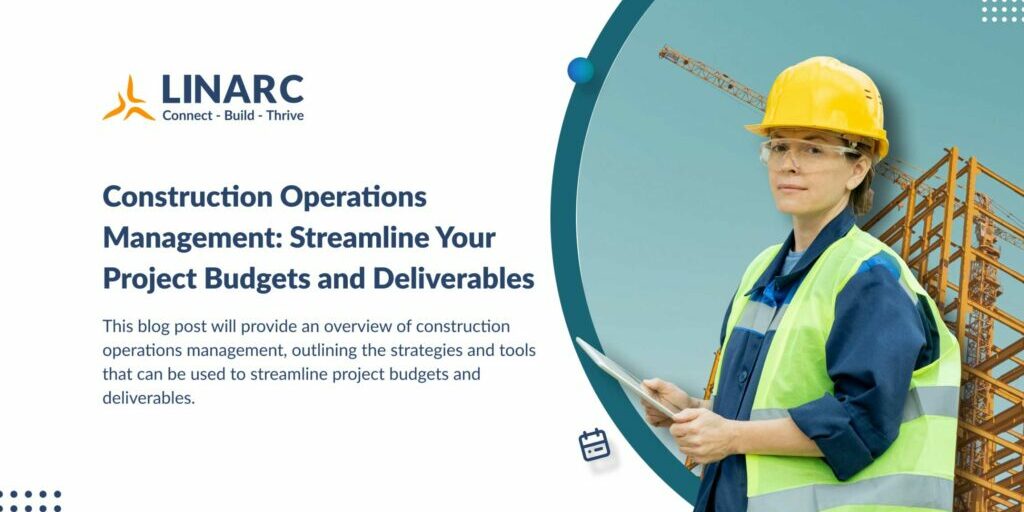Construction Operations Management: How to Streamline Your Project Budgets & Deliverables

In the fast-paced construction world, ensuring projects are completed efficiently and within budget is a top priority. From the initial phases of a construction project to the final deliverables, there’s a complex process at play that requires careful management and coordination to keep everything on track.
In this blog, we’ll explore the key aspects of construction operations management and provide valuable insights to help you optimize your construction process. Whether you’re a seasoned professional or just starting out, our insights will help you master construction operations management and streamline your project budgets and deliverables.
Here’s what we cover:
What is Construction Operations Management?
Construction operations management encompasses the strategic planning, coordination, and control of various activities throughout the construction process. It involves overseeing every phase of a construction project, from conception to completion, optimizing resources, managing risks, and ensuring timely, high-quality results.
This discipline involves managing multiple aspects, including project planning, scheduling, budgeting, procurement, logistics, and communication. The benefits of effective construction operations management include:
Increased Project Efficiency
Effective construction operations management streamlines workflows, minimizes delays, and improves overall project efficiency. By implementing efficient processes, identifying bottlenecks, and leveraging technology, teams can save valuable time and resources. This leads to smoother operations, reduced downtime, and improved productivity, ultimately resulting in projects being completed on schedule or ahead of time.
Project Cost Savings
Construction projects are often plagued by cost overruns and budgetary challenges. However, with robust construction operations management practices, costs can be closely monitored and controlled. Through accurate budget forecasting, proactive risk management, and efficient resource allocation, unnecessary expenditures can be minimized.
Additionally, identifying potential cost-saving opportunities and optimizing procurement processes can result in significant savings throughout the project lifecycle.
Improved Communication
Communication breakdowns are common in complex construction projects involving multiple stakeholders. Effective operations management fosters transparent and streamlined communication channels, ensuring all team members are well-informed and working towards shared goals. Clear lines of communication facilitate collaboration, enable timely decision-making, and minimize misunderstandings or conflicts.
This leads to improved coordination, reduced rework, and a more harmonious working environment.
Strategies to Streamline Your Project Budget
In theory, effective and efficient construction operations sound idyllic. However, with the many moving pieces involved in the construction process, staying on track and under budget can be challenging. We’ve outlined some strategies and tools to help you streamline project budgets effectively:
Strategy #1: Ensure Accurate Cost Estimation
It’s highly unlikely that your initial estimate will be the same as your construction project’s final total cost. However, comprehensive assessments allow developers to make critical decisions and, ultimately, streamline your project budget effectively.
Thoroughly assessing project requirements, conducting comprehensive material and labor analysis, and considering potential risks and contingencies are crucial for accurate cost estimation. By leveraging historical data, industry benchmarks, and expert knowledge, construction professionals can develop more precise budget forecasts and avoid cost overruns.
Strategy #2: Optimize Resource Allocation
Effective resource allocation is essential for cost control and efficient project execution throughout every phase of your construction process. Construction operations managers must assess the project’s resource needs and allocate them accordingly. This includes labor, equipment, materials, and subcontractors. Unnecessary costs can be minimized by effectively managing resource utilization and minimizing idle time.
Strategy #3: Practice Regular and Transparent Financial Reporting
Financial reporting is vital for monitoring project budgets and identifying potential deviations. Construction management involves establishing robust reporting mechanisms that track actual costs, compare them against the budget, and provide clear insights into the project’s financial health. Timely financial reporting enables informed decision-making and early intervention if budget adjustments are required.
Strategies for Streamlining Project Deliverables
Throughout the many phases of construction projects, streamlining project deliverables is essential for ensuring timely and successful outcomes. By streamlining project deliverables, your team can ensure that the final results are achieved promptly, meet the required specifications, and align with client expectations. We’ve outlined a few strategies to help you minimize delays, improve efficiency, and enhance the overall quality of your project deliverables:
Strategy #1: Plan with Care
Thorough project planning is crucial for streamlining deliverables during the construction process. This includes defining project scope, establishing clear objectives, breaking down tasks, and developing realistic timelines. With a well-defined plan in place, your team can streamline their efforts, optimize resource allocation, and avoid unnecessary delays.
Strategy #2: Streamline Scheduling
Implementing effective scheduling practices is essential for timely project delivery. Delays can be minimized by proactively managing the project schedule, and potential bottlenecks can be addressed immediately in real-time.
Strategy #3: Implement Quality Control Measures
Ensuring consistent quality throughout the project is essential for streamlining project deliverables. Construction operations involve implementing rigorous quality control measures, including inspections, testing, and adherence to industry standards. By establishing robust quality assurance protocols, construction professionals can mitigate the risk of rework, delays, and costly errors.
Streamline Your Construction Process with Construction Management Software
If you’re struggling to streamline your construction process, construction management software is an effective tool that can help you meet deadlines and stay under budget. Construction management software provides a centralized platform for efficient collaboration, communication, and project tracking—allowing you to plan, schedule, and make changes to your project in real-time.
By leveraging this cloud-based technology, your team can streamline its entire operations, from initial planning to final deliverables. The software enables effective project scheduling, allowing for better resource allocation and optimized timelines— while also facilitating real-time tracking of project progress, ensuring that deliverables stay on schedule and enabling timely intervention if deviations occur.
Additionally, construction management software offers robust budget management features, allowing for accurate cost tracking, forecasting, and financial reporting. By automating manual processes and providing comprehensive data insights, construction management software empowers teams to make informed decisions, minimize delays, control costs, and deliver projects successfully.
Best Practices for Implementing Construction Operations Management Strategies
As you set out to streamline your construction process and effectively manage your budget and deliverables, consider the following best practices:
- Invest in Digital Tools: You have enough to think about without the intricacies of manual processes and document management. Construction management software provides seamless access to project data from anywhere, facilitating efficient collaboration and real-time decision-making among team members—empowering you to stay on track and under budget.
- Seek Support: Provide training and support to ensure all team members can use your new technology to its fullest potential. This helps maximize the benefits of construction operations management practices and enhances overall project performance.
- Promote Collaboration: Foster a culture of collaboration and open communication among all project stakeholders. Encourage regular information sharing, cross-functional collaboration, and collective problem-solving to optimize project outcomes and keep your project moving forward.
Construction operations management can effectively streamline project budgets and deliverables by implementing these strategies, utilizing appropriate tools and technologies, and adhering to best practices. Embracing these principles can empower you to drive efficiency, cost savings, and successful project outcomes in an increasingly competitive industry.
If you’re ready to see the difference construction management software can make in streamlining your project budget and deliverables, contact a Linarc representative today.




